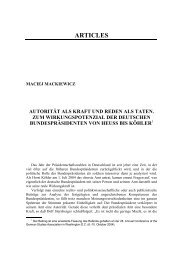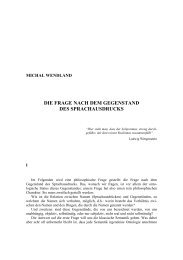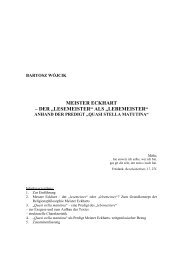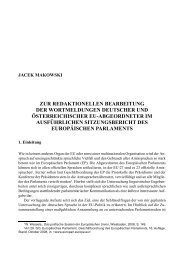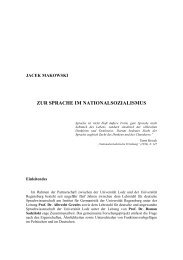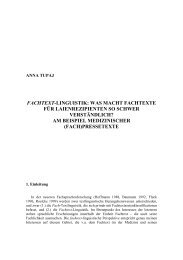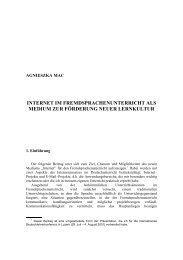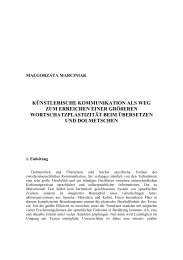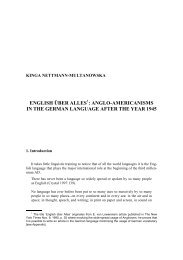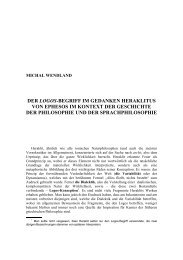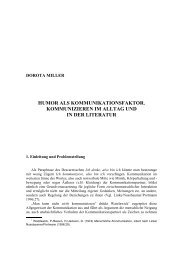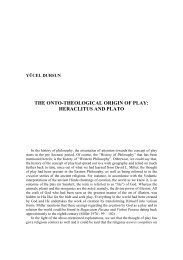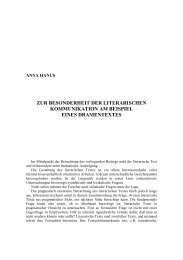V. – Tony Harrison's Poetic Dialectic - Lingua ac Communitas
V. – Tony Harrison's Poetic Dialectic - Lingua ac Communitas
V. – Tony Harrison's Poetic Dialectic - Lingua ac Communitas
Create successful ePaper yourself
Turn your PDF publications into a flip-book with our unique Google optimized e-Paper software.
<strong>Lingua</strong> <strong>ac</strong> <strong>Communitas</strong> | ISSN 1230-3143| Vol. 21 | 2011 | 21-32<br />
Wojciech Klepuszewski<br />
V. <strong>–</strong> <strong>Tony</strong> Harrison’s <strong>Poetic</strong> <strong>Dialectic</strong><br />
<strong>Tony</strong> Harrison’s long poem v. published in 1985, and televised by<br />
Channel Four in 1987 was a milestone in his literary career, not only because<br />
of the reception it received, but also because Harrison managed<br />
to use poetry as an effective tool for a debate concerning important social<br />
issues.<br />
Soon after it was published, Martin Booth called v. ‘the most outstanding<br />
social poem of the last 25 years’ 1 , though it was not until a year later,<br />
when a reading of the poem by <strong>Tony</strong> Harrison, directed by Richard Eyre,<br />
was aired that the public could really f<strong>ac</strong>e its true value and imp<strong>ac</strong>t. The<br />
filming, appreciated by some, caused widespread opposition on the part of<br />
those readers who felt appalled by its diction, namely the overt and ample<br />
use of expletives. As it turned out, however, a great number of those who<br />
expressed their outrage had not <strong>ac</strong>tually <strong>ac</strong>quainted themselves with the<br />
poem. As <strong>Tony</strong> Harrison notes in an interview:<br />
…the Daily Mail phoned around people who’ve never read the poem and<br />
don’t know me from Adam, and they shoot off their mouth, and they’re<br />
happy to be quoted, condemning something they know nothing about.<br />
That’s how it started. 2<br />
1 Booth, Martin. 1986. ‘The Personal as Universal’. Tribune, 21 February, p.10.<br />
2 http://www.bbc.co.uk/radio3/johntusainterview/harrison_transcript.shtml; 1.08.2011<br />
|21
22|<br />
Wojciech Klepuszewski<br />
Years after, the f<strong>ac</strong>t was humorously recalled by Andy Parsons during one<br />
of his stand-up <strong>ac</strong>ts, when he rightly pinpointed that after the film was<br />
shown, ‘over the course of the next 2 weeks they got 42 thousand complaints<br />
from people who hadn’t heard the original broadcast, but had heard<br />
that they might get offended, so they decided to tune in after the event to see<br />
if they were offended and were duly offended’. 3<br />
Regardless of what or who really triggered the sudden interest in v., the<br />
f<strong>ac</strong>t is that the regional and national papers, tabloids and broadsheets were<br />
flooded with articles and letters pertaining to the event, and the broadcasting<br />
authorities had to deal with complaints from the viewers. ‘A torrent<br />
of four-letter filth’ 4 is an example of many epithets that were used in the British<br />
press in a time span of about a month to label, classify, and, above all,<br />
to tar the televising of <strong>Tony</strong> Harrison’s poem on Channel Four. While quality<br />
papers tended to be more toned down in the matter, tabloids were offensive<br />
and critical, capitalising on the f<strong>ac</strong>t that a poem containing coarse language<br />
was <strong>ac</strong>tually presented on television. Most tabloids based their news<br />
on calculating the number of different swearwords used in the poem. The<br />
Sun, for example, found it of importance to inform its readers that the poem<br />
contained 90 swear words. 5<br />
Apart from the short-lived media frenzy, v. caused an enormous indignation<br />
on the part of the so-called Establishment, right-wing politicians in particular.<br />
It comes as no surprise that Carol Rutter views this public crusade as<br />
an unquestionable literary <strong>ac</strong>hievement of <strong>Tony</strong> Harrison: ‘Poetry hit the<br />
front page of the newspapers. Poetry even had questions asked about it in Parliament.<br />
Not bad for a bard!’ (1995: 29). What the public outcry reflected was<br />
that v. exposed vital intersections where issues concerning predominantly<br />
language and class collide and remain in conflict. This article focuses on how<br />
Harrison incorporates a poetic dialectic in v. in his quest to find integrity.<br />
The setting of v. is Holbeck cemetery in Leeds, where <strong>Tony</strong> Harrison’s<br />
family grave is located, and where he is making one of his rare visits (‘flying<br />
visits once or twice a year’). It is both the setting of the poem, as well as its<br />
mood that v. is often labelled a graveyard poem or an elegy. In this context,<br />
an obvious intertextual inspiration can be tr<strong>ac</strong>ed in Thomas Gray’s ‘Elegy<br />
Written in a Country Churchyard’, though Harrison repl<strong>ac</strong>es Gray’s rural<br />
milieu with urban, or in f<strong>ac</strong>t a suburban one. Whereas the voice in Gray’s<br />
3 Andy Parsons, Live at the Apollo, 28 Nov. 2009, series 4, episode 5, BBC.<br />
4 Deans John and Lenkins, Garry. 1987. ‘Four-letter TV poem fury.’ Daily Mail,<br />
12 October.<br />
5 ‘Battle to ban shock TV poem”. The Sun, 12 October 1987.
<strong>Lingua</strong> <strong>ac</strong> <strong>Communitas</strong> | ISSN 1230-3143| Vol. 21 | 2011 | 21-32<br />
poem contemplates the pl<strong>ac</strong>e where ‘The rude Forefathers of the hamlet<br />
sleep’ only to conclude that ‘The paths of glory lead but to the grave,’ 6 all<br />
within the frame of rural imagery, Harrison confronts the living and the<br />
dead, with imagery that is crude and often shocking (‘They're there to shock<br />
the living, not arouse the dead from their deep pe<strong>ac</strong>e’).<br />
The key issues in v. concern language and class, both of which have been<br />
of particular interest to Harrison ever since, after the introduction of the<br />
Eleven Plus examination by Butler Education Act in 1944, he won a scholarship<br />
at Leeds Grammar School, a f<strong>ac</strong>t which was to influence his work,<br />
and is particularly well-mirrored in his poetry. As a boy of working-class<br />
origin, Harrison became part of ‘a hidden pool of ability’ 7 , from which education<br />
authorities fished out the clever ones, ‘a parvenu elite picked for<br />
their brains’ (1974: 79) as Gamble calls them. Worpole emphasises that the<br />
selection of working-class boys to attend grammar schools often estranged<br />
them both from their families, as well as their class b<strong>ac</strong>kground (1991: 61).<br />
As he further observes, the eleven-plus exam ‘swept thousands of homes<br />
e<strong>ac</strong>h year like an icy wind, and … in many pl<strong>ac</strong>es destroyed the cementing<br />
ties of family and e<strong>ac</strong>h other, sometimes for ever. (1991: 62). 8<br />
The time spent in Leeds Grammar School gave Harrison the kind of education<br />
without which he would most probably not have become what he is<br />
now, but also made him realise how much class and language depend on e<strong>ac</strong>h<br />
other. As he himself came from not a particularly articulate and eloquent b<strong>ac</strong>kground,<br />
the language he was exposed to during his school years remained in<br />
sharp contrast with the one he had been brought up with. He was one of many<br />
boys victimised by some te<strong>ac</strong>hers who found pleasure in scorning workingclass<br />
pupils for their <strong>ac</strong>cents, 9 a f<strong>ac</strong>t which he often relates to in interviews:<br />
an English te<strong>ac</strong>her that I had at Leeds grammar school, would always, as<br />
soon as I opened my mouth to read a poem would stop me because I had<br />
a thick urban Leeds <strong>ac</strong>cent. I’d say ‘Me ‘eart <strong>ac</strong>hes in a drowsy numbness’<br />
‘Please, stop.’ 10<br />
6 http://www.blupete.com/Literature/Poetry/Elegy.htm; 25.08.2011.<br />
7 Central Advisory Council for Education (England): Ministry of Education 15018<br />
(HMSO), 1959.<br />
8 The question of relation between language and class became an important issue,<br />
particularly in w the 60s and 70s as a result of various theories put forward by Basil<br />
Bernstein in his publications. See, for example, Rosen, Harold. 1974. Language and<br />
Class: a critical look at the theories of Basil Bernstein. Bristol, Avon: Falling Wall.<br />
9 See Stevens, Frances. 1960. The Living Tradition. London: Hutchinson.<br />
10 http://www.bbc.co.uk/radio3/johntusainterview/harrison_transcript.shtml; 1.08.2011<br />
|23
24|<br />
Wojciech Klepuszewski<br />
This exasperating experience was later referred to in ‘Them & [uz]’, which<br />
is probably Harrison’s most often cited poem, particularly the line containing<br />
a retort to being lectured on the superiority of Received Pronunciation<br />
(‘We say [uS] not [uz]’):<br />
‘So right, yer buggers, then!<br />
We’ll occupy your lousy leasehold Poetry: (Harrison 1982: no pagination)<br />
In f<strong>ac</strong>t, much of Harrison’s work is marked as a quest to legitimise the vern<strong>ac</strong>ular.<br />
However, far from being an obsession of someone who feels obliged<br />
to pay tribute to the class of his origin, it is a genuine belief that language is<br />
the people who use it. As he puts it in an introduction to Astley’s<br />
anthology:<br />
…my upbringing among so-called ‘inarticulate’ people has given me<br />
a passion for language that communicates directly and immediately.<br />
I prefer the idea of men speaking to men to a man speaking to a god, or<br />
even worse to Oxford’s anointed. (1991: 9)<br />
This passion is most brilliantly displayed in v. which is also a prominent example<br />
of his ‘never-ending fight-b<strong>ac</strong>k against standardisation and class<br />
prejudice.’ 11 It seems that, following the logic of Mills’s remark who defines<br />
dialect as a ‘club which lets everyone in’ (Mills 2000: 128), Harrison deeply<br />
believes that dialect, paradoxically, equals inclusion, rather than the opposite.<br />
Harrison’s stance here is hardly surprising not only because of his b<strong>ac</strong>kground,<br />
but also because RP speakers in Britain constitute just a few per<br />
cent of the population, which decidedly makes it a minority variant. It comes<br />
as no surprise that when Harrison was to adapt medieval plays for the National<br />
Theatre, he demanded that God, Jesus and all the cast should have<br />
Yorkshire <strong>ac</strong>cents. Harrison’s logic was simple: ‘God in my version speaks<br />
the same language as the people he is talking to.’ 12<br />
Looking from the present perspective at the question of regional dialect<br />
one can find it hard to comprehend that only 30 years ago a guide for BBC<br />
presenters contained the following recommendation:<br />
it is assumed that the speaker uses Received Standard English in its<br />
1980s form. The form of speech recommended is that of a person born<br />
and brought up in one of the Home Counties, educated at one of the<br />
11 Glover, Michael. 2007. ‘<strong>Tony</strong> Harrison: Not to be read quietly’. The Independent,<br />
1 April.<br />
12 Brown, Andrew. 1993. ‘Harrison forward: Andrew Brown meets <strong>Tony</strong> Harrison,<br />
whose poetry goes straight to the heart and to the mind.’ The Independent & The Independent<br />
on Sunday, 23 January.
<strong>Lingua</strong> <strong>ac</strong> <strong>Communitas</strong> | ISSN 1230-3143| Vol. 21 | 2011 | 21-32<br />
established southern universities, and not yet so set in his ways that all<br />
linguistic change is regarded as un<strong>ac</strong>ceptable. 13<br />
Although in the case of the BBC things have changed enormously, the quotation<br />
is a superb indicator of the atmosphere att<strong>ac</strong>hed to language at the<br />
time v. re<strong>ac</strong>hed its public. It thus comes as no surprise that right after its<br />
publication and, more so, its televising, v. stirred such an uproar. After all,<br />
what Harrison had done was more than just a bre<strong>ac</strong>h of good manners <strong>–</strong><br />
it was a purposeful public violation of the language decorum, not for the<br />
sake of an artistic whim, but to shed light on social divisions and conflicts.<br />
The springboard for reflections on language and class in the poem is the<br />
f<strong>ac</strong>t that Harrison’s family grave, among many others, has been desecrated<br />
by vandals with obscene graffiti, most of which contain a selection of vulgarisms,<br />
as well as references to the local football club, Leeds United:<br />
The language of this graveyard ranges from<br />
a bit of Latin for a former Mayor<br />
…<br />
to CUNT, PISS, SHIT and (mostly) FUCK!<br />
Or, more expansively, there's LEEDS v.<br />
the opponent of last week, this week, or next,<br />
and a repertoire of blunt four-letter curses (Harrison 1989: 10)<br />
This small ‘v’ becomes the common denominator in the poem (‘These Vs<br />
are all the versuses of life’) and carries a great polysemic weight: behind e<strong>ac</strong>h<br />
of these v’s lie problems pivoting around various political, cultural and social<br />
issues. However, the central part of v. is dominated by a double-voiced<br />
discourse, largely based on an interrogative tone. The discourse Harrison<br />
adopts exposes the discrepancy between his b<strong>ac</strong>kground and his present<br />
status, a gap, as we later learn, he tries to bridge. The clash of attitudes is expressed<br />
here predominantly by means of the diction in the poem:<br />
What is it that these crude words are revealing?<br />
What is it that this aggro <strong>ac</strong>t implies?<br />
Giving the dead their xenophobic feeling<br />
or just a cri-de-coeur because man dies?<br />
So what's a cri-de-coeur, cunt? Can't you speak<br />
the language that yer mam spoke. Think of 'er!<br />
Can yer only get yer tongue round fucking Greek?<br />
Go and fuck yourself with cri-de-coeur! (Harrison 1989: 17)<br />
13 Burchfield, Robert. 1981. The Spoken Word: A BBC Guide. London, p. 9.<br />
|25
26|<br />
Wojciech Klepuszewski<br />
Harrison mingles what is formal and, at least in the eyes of the offended readers,<br />
plebeian, if not s<strong>ac</strong>rilegious: the classical form of the poem remains in<br />
sharp conflict with the demotic language used by the skinhead. For Harrison<br />
his poetic gift is a blessing, but also something that disinherits him from his<br />
b<strong>ac</strong>kground. As a working-class boy with Grammar School education, Harrison<br />
took part, as it were, in a class migration, however involuntarily it was. 14<br />
This alienation clearly transpires from the lines spoken by the skinhead:<br />
Don't talk to me of fucking representing<br />
the class yer were born into any more. (Harrison 1989: 22)<br />
In the context of class representation, language in v. is first and foremost a social<br />
identity marker, and the skinhead’s linguistic repertoire in this respect<br />
manifests a sense of belonging to working-class Leeds, Leeds United supporters<br />
and, as we learn later on, to those who have reasons to be most disappointed<br />
with the social and political reality. As Butler notices, ‘when you<br />
are against, your need is to unite with others.’ (1997: 95) and in this respect<br />
the skinhead’s differentiation is clear-cut. Part of the skinhead’s identification<br />
is his social status ( ‘ah’ve been on t’dole all mi life in fucking Leeds!’), and what<br />
vexes him in particular are the inscriptions on the graves listed at the beginning<br />
of the poem, which show names such as Wordsworth, or Byron 15 , all<br />
representing solid crafts: the first one built church organs, the other was<br />
a tanner. The skinhead resents the f<strong>ac</strong>t that he is unemployed, while ‘this lot<br />
worked at one job all life through’. As a result, he reasons that part of his aggravation<br />
is ‘reading on their graves the jobs they did’, only to conclude that:<br />
When dole-wallahs fuck off to the void<br />
What'll t'mason carve up for their jobs?<br />
The cunts who lieth ‘ere wor unemployed? (Harrison 1989: 18)<br />
It may be inferred that there is no option but to vent one’s frustration<br />
by spraying the graves with crude, offensive words, an <strong>ac</strong>t as desperate as<br />
ineffectual. Unemployed, his aggravation fortified with cheap lager, the<br />
14 The title of the study by Frances Stevens, The New Inheritors, perfectly defines this<br />
creation of a new social group, alienated from their class b<strong>ac</strong>kground. See Stevens,<br />
Frances. 1970. The New Inheritors. London: Hutchinson Educational. A good example<br />
of such alienation can also be found in a study by J<strong>ac</strong>kson and Marsden, in which they<br />
show a 65-73 percent shift from Labour to Conservative in the case of the working-class<br />
boys who were given a chance to attend grammar schools. See Brian J<strong>ac</strong>kson & Dennis<br />
Marsden. 1962. Education and the Working Class. Some general themes raised by a study<br />
of 88 working-class children in northern industrial city. London: Routledge, 1962, p. 194.<br />
15 Although this pun is deliberate, these names do appear on the graves of Holbeck<br />
cemetery.
<strong>Lingua</strong> <strong>ac</strong> <strong>Communitas</strong> | ISSN 1230-3143| Vol. 21 | 2011 | 21-32<br />
skinhead can offer nothing but ‘all these Vs: against! against! against!’<br />
He functions in the poem as a ‘generically representative voice of<br />
disaffection.’(Woodcock 1990: 61), though this disaffection does not re<strong>ac</strong>h<br />
far beyond a bitter <strong>ac</strong>ceptance of his life as it is (‘Me, I’ll croak doing t’same<br />
nowt ah do now as a kid’). Moreover, the skinhead rejects Harrison’s idea of<br />
using poetic means by which a positive change can be introduced:<br />
the reason why I want this in a book<br />
's to give ungrateful cunts like you a hearing!'<br />
A book, yer stupid cunt, ‘s not worth a fuck!<br />
'The only reason why I write this poem at all<br />
on yobs like you who do the dirt on death<br />
's to give some higher meaning to your scrawl.'<br />
Don't fucking bother, cunt! Don't waste your breath! (Harrison 1989: 19)<br />
But the true extent of this incap<strong>ac</strong>ity is not fully clarified until the final part<br />
of the dialogue between Harrison and the skinhead, representing the graveyard<br />
desecrators armed with graffiti sprays. What becomes transparent is<br />
that the whole conversation is just an internal dialogue. This is revealed<br />
when Harrison asks the skinhead to sign his name under the UNITED<br />
sprayed on Harrison’s parents’ grave: ‘He aerosolled his name. And it was<br />
mine.’ (Harrison 1989: 22) As Harrison admits, the skinhead in v. is inside<br />
him, 16 though of course this confession does not pertain only to v., but has<br />
to be read in a broader context of how his poetry is based on juxtaposing<br />
conflicting voices. As Harrison states himself, conflicts and opposites are<br />
fundamental for his poetry and, as transpires from the discourse in v., almost<br />
inseparable from his own experience:<br />
I think the versuses are very important to creating the verse … I think I need<br />
that dialectic, I suppose, to create. It’s part of my way of looking at things. 17<br />
However, as far as v. is concerned, Woodcock questions the outcome of this<br />
dialectic and concludes that Harrison the poet is ‘as impotent as the angry<br />
bovver boys he berates.’ (Woodcock 1990: 60). Whereas it may seem so on<br />
the surf<strong>ac</strong>e, in point of f<strong>ac</strong>t, the dialogic tangle in v. brings the reader closer<br />
to what Harrison’s poetic dialectic leads to. What Harrison successfully<br />
does in the poem is to give voice to ‘the linguistically impoverished and<br />
16 Brown, Andrew. 1993. ‘Harrison forward: Andrew Brown meets <strong>Tony</strong> Harrison,<br />
whose poetry goes straight to the heart and to the mind.’ The Independent & The Independent<br />
on Sunday, 23 January.<br />
17 http://www.bbc.co.uk/radio3/johntusainterview/harrison_transcript.shtml;<br />
1.08.2011.<br />
|27
28|<br />
Wojciech Klepuszewski<br />
angry’ (Broom 2006: 19), even more so when he reads the poem in the film,<br />
which for Harrison, by the way, was ’a long slow-burning revenge’ 18 executed<br />
on the te<strong>ac</strong>her who mocked his <strong>ac</strong>cent and did not allow him to recite poetry<br />
aloud. It was particularly the public reading of v. that seems to have<br />
vexed a great number of the readers: the f<strong>ac</strong>t that Harrison made public what<br />
is generally believed to belong to the margin and is expected to continue its<br />
existence there. As expressed by one reader in a letter to the editor:<br />
The four-letter words are best left where they are, in the mind, the<br />
mouth, and the locations where editors, writers and publishers legitimately<br />
exercise their freedom to express themselves as they wish. 19<br />
And this is ex<strong>ac</strong>tly what Harrisons <strong>ac</strong>hieves: he contaminates the language in<br />
v. not only with the vern<strong>ac</strong>ular, but, more importantly, with the vulgar,<br />
though the latter has a meaningful purpose: it shows the power of language,<br />
particularly in the context of the b<strong>ac</strong>klash against the televising of v.<br />
Harrison is also a social commentator, who employs conflicting voices,<br />
not in a simple poem to read and contemplate, but in a complex challenge<br />
to the burning issues of the time.<br />
Intertwined with the language is the issue of class divisions, which is<br />
omnipresent in the poem, particularly emphasised in the line spoken by<br />
the skinhead, or Harrison’s alter ego:<br />
it's not poetry we need in this class war. (Harrison 1989: 22)<br />
One should not forget that Harrison wrote his poem in a particularly polarised<br />
period, namely the miners’ strike of 1984-85. He couldn’t have chosen<br />
the timing better, as the period was marked by closing of many mines and<br />
a significant weakening, if not f<strong>ac</strong>tual destruction of the union trades in<br />
Britain. All this is perfectly pronounced in the poem:<br />
Class v. class as bitter as before,<br />
the unending violence of US and THEM<br />
personified in 1984<br />
by Coal Board M<strong>ac</strong>Gregor and the NUM (Harrison 1989: 11)<br />
Harrison challenges the class issues in v. and frames them within a period of<br />
social and political turbulence in the UK. His poem is an uncompromising<br />
critique of class divisions, and in many lines it is concurrent with political<br />
climate of the day:<br />
18 Garner, Brent. 1986. ‘<strong>Tony</strong> Harrison: Scholarship Boy.’ Trans<strong>ac</strong>tions of the<br />
Yorkshire Dialect Society, p. 23.<br />
19 ‘Letters to the Editor’ The Times 24 October 1987 ‘ S. Butterworth
<strong>Lingua</strong> <strong>ac</strong> <strong>Communitas</strong> | ISSN 1230-3143| Vol. 21 | 2011 | 21-32<br />
Letters of transparent tubes and gas<br />
in Düsseldorf are blue and flash out KRUPP.<br />
Arms are hoisted for the British ruling class<br />
and clandestine, genteel aggro keeps them up. (Harrison 1989: 16)<br />
The extent to which Harrison intervenes in Thatcherite politics certainly<br />
pl<strong>ac</strong>es him among those whom Margaret Thatcher defined as ‘the enemy<br />
within’ when she drew a parallel between the Falklands War and the miners’<br />
strike during a meeting with Conservative MPs at Westminster in<br />
1984. 20 From the present perspective, particularly ‘the unending violence<br />
of US and THEM’ in regard to class seems a point worth considering, as<br />
only ten years after the televising of v. John Prescott declared before the<br />
1997 election that ‘We are all middle class now’ 21 (the phrase was later<br />
adopted by <strong>Tony</strong> Blair). For Harrison, it is just an absurd slogan, completely<br />
det<strong>ac</strong>hed from reality. When asked to reflect upon v. from a 2009 perspective,<br />
<strong>Tony</strong> Harrison makes an interesting comment on the problem of<br />
class divisions in the UK, and whether v. in this respect can still be<br />
relevant:<br />
They do still exist, and they’re returning, in a strange way. The have and<br />
have-nots are becoming quite marked again and the idea of New Labour<br />
as being class-free is a fantasy. The old divisions are still there, just not<br />
expressed in the same way. 22<br />
Harrison’s remark about the class divisions being redressed 23 reflects his own<br />
misgivings about his poetic work, and being, as he calls it, ‘a public poet’,<br />
a concept which he often refers to in interviews, and which seems particularly<br />
relevant in the case of v.:<br />
20 http://www.margaretthatcher.org/document/105563; 7.08.2011.<br />
21 Sylvester, R<strong>ac</strong>hel. 2010. ‘Class war is so last week for new Gordon Brown.’ The Times,<br />
19 January.<br />
22 Butler, Stephen and Klepuszewski, Wojciech. 2009. ‘It’s a grand trade to be in <strong>–</strong><br />
interview with <strong>Tony</strong> Harrison’. (unpublished).<br />
23 And this is certainly not Harrison’s idiosyncratic view. As Ferguson observes:<br />
There’s no doubt that the days of visibly desperate aspiration are gone; we just laugh at<br />
those who believe that language and table-manners can raise them up the social scale<br />
…The point is that we haven’t moved on that far, certainly not nearly as far as the useful<br />
myth would have it … All we have witnessed is the Balkanisation of class. Instead of<br />
there being three main snobberies <strong>–</strong> upper looking down on middle looking down on<br />
working <strong>–</strong> we have a slew of finer gradations. We have the very rich, and the very poor,<br />
and in between them not one vast homogeneous middle class but six or seven. The differences<br />
might not be so obvious, but they’re certainly there. See Ferguson, Euan.2001.<br />
‘We’re All Snobs Now’. The Observer, 30 September.<br />
|29
30|<br />
Wojciech Klepuszewski<br />
I was determined to make v. more public, which is part of the bard’s poetic<br />
status. The television transmission of the poem was a part of that. 24<br />
Despite the stated determination, he remains sceptical whether his public<br />
mission as a bard can have any pr<strong>ac</strong>tical implications. Harrison confirms his<br />
doubts by saying that ‘poetry is not a popular art; it doesn’t change anything.’ 25<br />
This is almost a direct borrowing from ‘In Memory of W.B. Yeats’ by<br />
W.H.Auden:<br />
For poetry makes nothing happen: it survives<br />
In the valley of its making… 26<br />
This doubt is also reflected in his conversation with the skinhead and echoes<br />
the latter’s conviction that it is simply a waste of time:<br />
There’s always a skinhead, who is a persistent voice in my own head, saying<br />
“This is all a pile of shit.” 27<br />
Yet, within Harrison’s dialectic the skinhead’s voice always has a counterpart<br />
in the voice of the poet. Harrison in yet another intertextual manner relates<br />
to Shakespeare’s Prospero by saying: ‘This pen’s all I have of a magic wand’<br />
(Harrison 1989: 15). However, if one interprets the line as a doubt that poetry<br />
can effectively f<strong>ac</strong>e social problems, one cannot escape the feeling that<br />
in Harrison’s hands this magic wand unites and integrates. It is so, because<br />
Harrison, as Garofalakis suggests, ‘does not simply reveal the dichotomies<br />
… Harrison questions the paradoxical unions of the dualities wherever they<br />
may occur’(1991: 203). Much as there is room for division, there is room for<br />
unification, though this is forged in conflict (‘the skin and poet united …<br />
but the autre that je est is fucking you.’).<br />
Harrison, almost subversive in his confrontation with the established order<br />
(Thatcher’s enemy within) uses antagonisms in the poem, particularly<br />
in the discourse with the skinhead, to reveal his own enemy, one which divides<br />
the self:<br />
Half versus half, the enemies within<br />
the heart that can't be whole till they unite. (Harrison 1989: 23)<br />
What finally transpires from v. is that he, as has been suggested, finds<br />
(or tries to do so) integrity where all seems to divide. Even if he expresses<br />
24 Butler, Stephen and Klepuszewski, Wojciech. 2009.<br />
25 Jaggi, Maya. 2007. ‘Beats of the heart’. The Guardian, 31 March.<br />
26 http://www.poets.org/viewmedia.php/prmMID/15544; 12.08.2011.<br />
27 Butler, Stephen and Klepuszewski, Wojciech. 2009.
<strong>Lingua</strong> <strong>ac</strong> <strong>Communitas</strong> | ISSN 1230-3143| Vol. 21 | 2011 | 21-32<br />
doubts about his mission as a poet, he confirms this imperative in the<br />
poem:<br />
Next millennium you'll have to search quite hard<br />
to find my slab behind the family dead,<br />
butcher, publican, and baker, now me, bard<br />
adding poetry to their beef, beer and bread. (Harrison 1989: 7)<br />
Harrison the poet is a bard, but not one that speaks to us from a pedestal.<br />
He is not disconnected from his b<strong>ac</strong>kground, for his job is as tangible as that<br />
of any of those craftsmen he mentions in his poem:<br />
Writing poetry is no more or less important than baking bread, pulling<br />
a pint. … In this way he asserts a type of belonging with non-poets, simple<br />
men of their trade. (Mills 2000: 132)<br />
He is of his class though he can express it in a classical form, which annoyed<br />
many of the readers in the eighties. Despite his own doubts, expressed<br />
in the poem, as well as in a number of interviews v. as a an internal<br />
discourse turns out to be conclusive. The public reading of v. stirred<br />
controversy which went beyond what Harrison expected and beyond the<br />
merits of his poem. What most of the readers and the general public failed<br />
to notice was the f<strong>ac</strong>t that Harrison used his diction as a means not an end<br />
in itself. So the debate at the time of televising blurred the f<strong>ac</strong>t that in v.<br />
Harrison uses conflicting voices in order to ‘plead for incorporation and<br />
unity, despite the antagonistic thrust of much of its language and energy.’<br />
(O’Brien 1998: 60). Throughout the poem, Harrison juggles with various<br />
versuses, but also embeds an occasional ‘united’, which, for example, is<br />
sprayed on his parents’ grave, or functions, paradoxically, in the context<br />
of the local football team. In the closing fragments of the poem, the UNIT-<br />
ED and ‘v’ return, not to divide, but, in a more subdued manner, to<br />
integrate:<br />
If love of art, or love, gives you affront<br />
that the grave I’m in’s graffitied then, maybe,<br />
erase the more offensive FUCK and CUNT<br />
but leave, with the worn UNITED, one small v. (Harrison 1989: 32)<br />
This small ‘v’, as Harrison reveals in the subsequent lines, no longer belongs<br />
in his imbroglio, but suggests that all the versuses in the poem, may, as a result<br />
of this poetic dialectic, lead to simple integrative ‘Victory?’. And Harrison’s<br />
victory lies in finding an equilibrium built on oppositions and<br />
conflicts.<br />
|31
32|<br />
Literature<br />
Wojciech Klepuszewski<br />
Astley, Neil (ed.). 1991. Bloodaxe Critical Anthologies: <strong>Tony</strong> Harrison. Newcastle:<br />
Bloodaxe Books.<br />
Astley, Neil (ed.). 1993. Poetry with an Edge. Newcastle: Bloodaxe Books.<br />
Broom, Sarah. 2006. Contemporary British and Irish Poetry: An Introduction. Basingstoke:<br />
Houndmills; New York: Palgrave M<strong>ac</strong>millan.<br />
Butler, Christopher. 1997. ‘Culture and Debate.’ In Byrne, 93-114.<br />
Byrne, Sandie (ed.). 1997. <strong>Tony</strong> Harrison: Loiner. Oxford: Clarendon Press.<br />
Byrne, Sandie. 1998. H,v. & O: The Poetry of <strong>Tony</strong> Harrison. Manchester: Manchester<br />
University Press.<br />
Corcoran, Neil (ed.). 2007. The Cambridge Companion to Twentieth-Century English<br />
Poetry. Cambridge: Cambridge University Press.<br />
Corcoran, Neil. 1993. English Poetry Since 1940. London: Longman.<br />
Gamble, Andrew. 1974. Conservative Nation. London: Routledge and Kegan Paul.<br />
Garofalakis, Mary. 1991. ‘One Continuous Us.’ In Astley, 202-209.<br />
Harrison, <strong>Tony</strong>. 1982. Continuous: 50 sonnets from The School of Eloquence. London:<br />
Rex Collings.<br />
Harrison, <strong>Tony</strong>. 1989. v. Newcastle upon Tyne: Bloodaxe Books.<br />
J<strong>ac</strong>kson, Brian and Marsden, Dennis. 1960. Education and the Working Class. Some<br />
general themes raised by a study of 88 working-class children in northern industrial<br />
city. London: Routledge and Kegan Paul.<br />
Kelleher, Joe. 1996. <strong>Tony</strong> Harrison. Plymouth: Northcote House.<br />
Knauer, Krzysztof and Murray, Simon (eds.). 2000. Britishness and Cultural Studies.<br />
Continuity and Change in Narrating the Nation. Katowice: Śląsk Wydawnictwo<br />
Naukowe.<br />
Mills, Paul. 2000.’Poetry in the Hands of the Receivers <strong>–</strong> <strong>Tony</strong> Harrison’s v: Class<br />
and Language in 1980’s England.’ in Knauer and Murray, 125-141.<br />
O’Brien, Sean. 1998. The Deregulated Muse. Newcastle: Bloodaxe Books.<br />
Roberts, Neil. 1999. Narrative and Voice in Postwar Poetry. London: Longman.<br />
Rutter, Carol (ed.). 1995. <strong>Tony</strong> Harrison: Permanently Bard. Newcastle: Bloodaxe<br />
Books.<br />
Spencer, Luke. 1994. The Poetry of <strong>Tony</strong> Harrison. London: Harvester Wheatsheaf.<br />
Worpole, Ken. 1991. ‘Scholarship Boy: The Poetry of <strong>Tony</strong> Harrison… In Astley,<br />
61-74.<br />
Woodcock, Bruce. 1990. ‘Classical vandalism: <strong>Tony</strong> Harrison’s invective’. Critical<br />
Quarterly, Volume 32, Issue 2, pp. 50<strong>–</strong>65.



